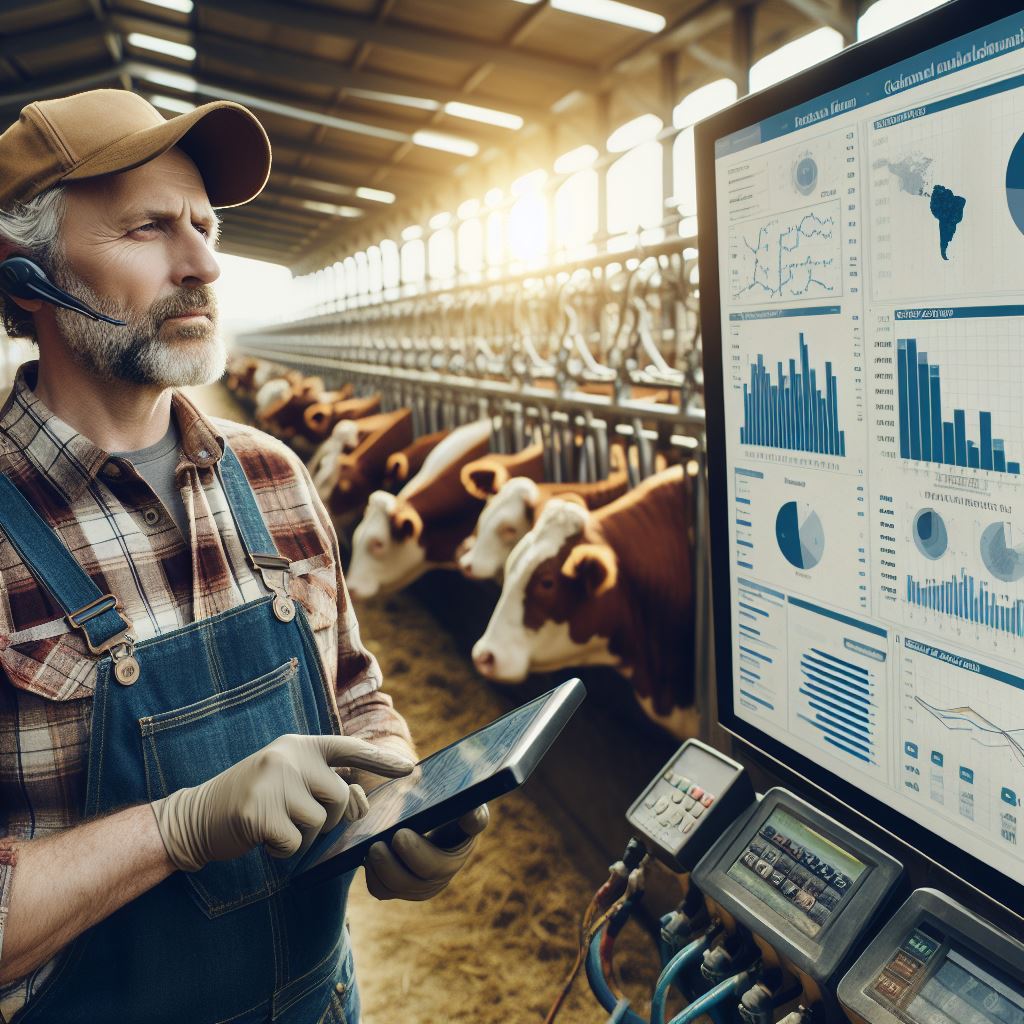Data-Driven Livestock Nutrition Plans
Last Updated on January 24, 2024
Introduction
Livestock nutrition is crucial for the growth, health, and productivity of animals in modern agriculture.
Proper nutrition ensures optimal performance and reduces the risk of disease and mortality.
Brief overview of the importance of livestock nutrition
Livestock nutrition plays a vital role in achieving high-quality animal products such as meat, milk, and eggs.
It directly affects the profitability and sustainability of livestock operations.
A balanced diet provides the necessary nutrients for growth, reproduction, and overall well-being.
The role of data-driven approaches in modern agriculture
With the advancement of technology, data-driven approaches are revolutionizing livestock nutrition.
Farmers now have access to vast amounts of data that can be analyzed to make informed decisions about animal nutrition.
This approach allows for a more precise and individualized feeding plan based on animal needs, improving efficiency and reducing costs.
By collecting data on factors such as feed intake, weight gain, and health status, farmers can identify trends, optimize nutrient ratios, and make adjustments in real-time.
Advanced technologies like sensors, smart devices, and machine learning algorithms enable continuous monitoring and analysis of animal performance.
These data-driven insights help farmers identify early signs of disease, adjust feed formulations, and maximize productivity.
Data-driven livestock nutrition plans also contribute to sustainable agriculture by minimizing environmental impact.
By fine-tuning nutrient requirements, farmers can minimize nutrient wastage, reduce greenhouse gas emissions, and ensure efficient utilization of resources.
Basically, data-driven approaches have transformed livestock nutrition by offering more precise and individualized feeding plans.
These plans not only enhance animal health, productivity, and profitability but also promote sustainable practices in modern agriculture.
Understanding data-driven livestock nutrition plans
Livestock nutrition plans that are data-driven utilize information and technology to optimize animal health and performance.
Definition and explanation of data-driven livestock nutrition plans
Data-driven livestock nutrition plans involve collecting and analyzing data on various factors such as animal health, growth, and feed efficiency.
This information is then used to create specific dietary requirements for each animal, ensuring optimal nutrition.
Utilization of data and technology in developing these plans
Data and technology play a significant role in developing data-driven livestock nutrition plans. Information is collected through sensors, electronic identification tags, and other monitoring devices.
This data is then analyzed using advanced software and algorithms to identify patterns, trends, and correlations.
Benefits of data-driven approaches in livestock nutrition
- Improved animal health: Data-driven approaches allow for personalized nutrition plans, leading to better overall health and well-being of the animals.
- Enhanced feed efficiency: By analyzing data on animal performance and dietary intake, nutritionists can optimize feed formulations, reducing wastage and improving efficiency.
- Increased productivity: Data-driven approaches enable farmers to identify specific nutritional needs, resulting in improved growth rates, reproduction, and milk or meat production.
- Cost savings: With accurate data analysis, farmers can minimize overfeeding or underfeeding, leading to cost savings in feed expenses.
- Environmental sustainability: By optimizing feed conversion and reducing waste, data-driven plans contribute to more sustainable livestock production practices.
- Early disease detection: Monitoring data can help identify early signs of disease or nutritional deficiencies, allowing for prompt intervention and prevention.
- Real-time monitoring: Sensors and monitoring devices provide real-time data on animal behavior, helping farmers quickly respond to any issues or abnormalities.
- Precision feeding: Utilizing data on individual animals’ nutritional needs, precision feeding is possible, resulting in better nutrient utilization and reduced environmental impact.
- Better decision-making: Data-driven plans provide farmers with accurate information, empowering them to make informed decisions regarding nutrition, breeding, and health management.
- Continuous improvement: By continuously collecting and analyzing data, livestock nutrition plans can be refined and optimized over time, leading to ongoing improvements in animal care and performance.
Generally, data-driven livestock nutrition plans offer numerous advantages in terms of improved animal health, increased productivity, cost savings, and environmental sustainability.
The utilization of data and technology in developing these plans allows for precise and personalized nutrition, leading to better overall outcomes for both animals and farmers.
Read: GPS Tracking: Transforming Herd Management
Collecting and analyzing data for livestock nutrition
In order to develop effective and efficient livestock nutrition plans, it is crucial to gather and analyze accurate data.
This section will explore the various sources of data and the tools and technologies used for data collection and analysis.
Additionally, it will emphasize the importance of reliable data in the decision-making process.
Sources of data
Feed analysis is a vital source of data for livestock nutrition plans. It involves analyzing the nutritional content of feeds and understanding their impact on animal health and performance.
Animal health records provide valuable insights into the health status of livestock.
These records include information about vaccinations, treatments, and any diseases or disorders that the animals may have experienced.
Performance metrics, such as weight gain, milk production, and reproduction rates, offer essential data on the overall performance of livestock.
These metrics help in evaluating the effectiveness of the nutrition plans and making necessary adjustments.
Tools and technologies used for data collection and analysis
Modern technology has revolutionized data collection and analysis in livestock nutrition.
One significant tool is the use of electronic feeders and waterers, which automatically record and analyze the consumption patterns of animals.
Remote sensing technologies, like drones and satellites, provide valuable data on pasture quality, vegetation growth, and environmental factors that impact livestock nutrition.
This data aids in making informed decisions about grazing management.
Digital platforms and software applications are used to collect and manage data efficiently.
These platforms streamline data entry, analysis, and reporting, enabling livestock producers to make data-driven decisions more effectively.
Importance of accurate and reliable data
Accurate and reliable data is vital for making informed decisions and developing effective livestock nutrition plans.
It ensures that animals receive the appropriate nutrients, leading to improved health, performance, and overall well-being.
Data-driven decision-making helps optimize feed utilization, minimizing production costs and maximizing resource efficiency.
By analyzing performance metrics, producers can identify areas needing improvement and tailor nutrition plans accordingly.
Reliable data assists in monitoring animal health and identifying patterns or anomalies that may require prompt intervention.
Early detection of health issues leads to timely treatment, reducing the risk of disease spread and minimizing economic losses.
Moreover, accurate data plays a crucial role in complying with regulatory requirements and certification programs related to animal welfare and sustainability.
It demonstrates responsible practices and ensures transparency in the livestock industry.
Essentially, collecting and analyzing data for livestock nutrition plans is essential for optimizing animal health and performance.
Feed analysis, animal health records, and performance metrics serve as valuable sources of data.
The use of tools such as electronic feeders, remote sensing technologies, and digital platforms greatly streamline data collection and analysis.
Accurate and reliable data enables informed decision-making, resulting in improved animal welfare and optimized resource utilization.
Read: IoT in Agriculture: Livestock Applications
Developing customized nutrition plans
Creating individualized nutrition plans for livestock is a crucial aspect of ensuring their optimal health and productivity.
These plans are developed based on collected data regarding various factors such as age, breed, weight, and specific nutritional requirements.
The process of creating individualized nutrition plans based on collected data
The process of developing customized nutrition plans begins with the collection of relevant data.
This data includes information on the age, breed, and weight of the livestock, as well as their specific nutritional needs.
Once the necessary data is collected, it is analyzed to determine the specific nutritional requirements of each animal.
This analysis may involve the use of advanced software and algorithms to optimize the nutrition plans.
The collected data is examined to identify any deficiencies or imbalances in the livestock’s current diet.
By understanding the gaps in their nutrition, targeted adjustments can be made to improve their overall health and well-being.
The process also involves considering the goals of the livestock owner or manager.
For example, if the objective is to enhance milk production in dairy cows, the nutrition plan will focus on providing the necessary nutrients for lactation.
The use of software and algorithms for optimizing livestock nutrition
To develop accurate and effective nutrition plans, the use of software and algorithms has become increasingly common in the livestock industry.
These tools help analyze large amounts of data and generate precise recommendations.
Software programs can assess the nutritional content of various feed ingredients and formulate diets that meet the specific requirements of each individual animal.
By taking into account the data collected, these algorithms can develop nutrition plans that optimize the health and productivity of the livestock.
Factors considered
Several factors are taken into consideration when developing individualized nutrition plans for livestock.
The age of the animal plays a critical role as different life stages require varying nutrients.
The breed of the animal is also a relevant factor as different breeds have unique nutritional needs and tolerances.
Breed-specific requirements ensure that the livestock receives the appropriate nutrients to support their growth and performance.
Weight is another crucial factor in determining nutritional requirements.
A heavier animal may require different feeding strategies compared to a lighter one, taking into account energy demands and growth rates.
Specific nutritional requirements are assessed based on the livestock species and their intended purpose.
For example, a racehorse will have different dietary needs compared to a beef cow or a laying hen.
In general, developing customized nutrition plans for livestock involves a meticulous process of collecting and analyzing data.
The use of software and algorithms, along with consideration of factors such as age, breed, weight, and specific nutritional requirements, ensures optimal nutrition and well-being for the animals.
Read: Sensor Tech in Livestock Care: An Insight

Benefits of Data-Driven Livestock Nutrition Plans
Data-driven livestock nutrition plans have become increasingly popular in modern farming practices.
These plans involve the use of advanced technology and analytics to optimize the nutrition and feeding programs for livestock.
The benefits of implementing data-driven livestock nutrition plans are numerous and can have a significant impact on animal health, productivity, and overall farm profitability.
Improved Animal Health and Welfare
- Data-driven nutrition plans provide a more accurate assessment of the nutritional needs of individual animals.
- By tailoring feed formulations based on data analysis, livestock can receive a balanced diet, promoting good health.
- Health issues such as nutrient deficiencies or excesses can be identified and resolved promptly using data insights.
- Preventing health problems through proper nutrition leads to happier and healthier animals.
Enhanced Productivity and Efficiency in Livestock Operations
- Optimizing nutrition plans based on data analysis helps maximize the productivity of livestock.
- By providing animals with the right nutrients in the right amounts, their growth and development can be accelerated.
- Data-driven plans also enable farmers to identify high-performing animals and replicate their success.
- Precise feeding programs reduce feed wastage and increase overall efficiency in livestock operations.
Reduced Feed Costs and Environmental Impact
- Implementing data-driven nutrition plans allows farmers to optimize feed usage and reduce costs.
- By formulating feed based on specific nutritional requirements, feed wastage can be minimized.
- Reducing feed waste not only saves money but also has a positive environmental impact by reducing resource consumption.
- Data-driven plans help farmers make informed decisions regarding sustainable sourcing and production of feed ingredients.
Enhanced Overall Farm Profitability
- Optimized nutrition plans result in healthier and more productive livestock, leading to higher profitability.
- By reducing feed costs and improving efficiency, farmers can increase their profit margins.
- Data-driven plans also help farmers identify cost-effective alternatives for feed ingredients.
- By monitoring and adjusting nutrition plans based on real-time data, farmers can mitigate financial risks and maximize profits.
In essence, data-driven livestock nutrition plans provide numerous benefits for farmers.
They improve animal health and welfare, enhance productivity and efficiency, reduce feed costs, and ultimately increase overall farm profitability.
Implementing such plans not only ensures better outcomes for livestock but also contributes to a more sustainable and environmentally friendly farming industry.
Embracing data-driven approaches is key to staying competitive and successful in the evolving field of livestock nutrition.
Read: Livestock Genetics: Tech-Driven Breeding
Challenges and Considerations
Implementing data-driven livestock nutrition plans can present several challenges and considerations.
It is important to address these factors in order to effectively harness the benefits of data-driven decision-making in livestock nutrition.
Potential Challenges
- Lack of access to necessary data: Availability of accurate and reliable data is crucial for developing data-driven livestock nutrition plans.
- Inadequate infrastructure: Limited technological infrastructure may hinder the collection and analysis of relevant data.
- Data quality and integrity: Ensuring data accuracy, completeness, and integrity can be a major challenge.
- Complex data analysis: Analyzing large volumes of data and extracting actionable insights requires specialized skills and expertise.
- Resistance to change: Implementing data-driven approaches may face resistance from traditional practices and mindsets.
The Importance of Skilled Professionals and Technical Support
Skilled professionals and technical support play a critical role in successfully implementing data-driven livestock nutrition plans:
- Expertise in data analysis: Professionals with knowledge in statistical analysis and data interpretation can help derive meaningful insights from collected data.
- Specialized skills: Nutritionists, veterinarians, and livestock specialists are required to interpret data and develop appropriate nutrition plans.
- Technical support: Access to advanced technological tools and software can aid in the collection, management, and analysis of data.
- Research collaboration: Collaboration between professionals and researchers ensures the development of evidence-based nutrition plans.
The Need for Continuous Monitoring and Adjustment of Plans
Data-driven livestock nutrition plans should be subject to continuous monitoring and adjustment to ensure optimal results:
- Real-time data collection: Continuous monitoring helps track changes in livestock conditions and identify potential areas for improvement.
- Regular data analysis: Periodic analysis allows for timely identification of any deviations from the desired nutritional targets.
- Adaptation to changing conditions: Environmental factors, market dynamics, and animal health conditions necessitate the adjustment of nutrition plans.
- Feedback loop: Feedback from experienced professionals and farmers is essential for refining and optimizing the nutrition plans.
- Data-driven decision-making: The ability to consistently monitor and adjust plans based on data ensures better livestock health, productivity, and profitability.
In a nutshell, implementing data-driven livestock nutrition plans comes with challenges, such as data accessibility, infrastructure limitations, and resistance to change.
Skilled professionals, technical support, and continuous monitoring are crucial elements in overcoming these challenges.
By embracing data-driven decision-making, livestock farmers can enhance their nutrition plans and achieve improved outcomes for their animals and businesses.
Conclusion
Data-driven livestock nutrition plans hold immense importance in ensuring the health and productivity of livestock.
The use of data allows farmers to make informed decisions regarding their animals’ nutritional needs.
Furthermore, the field of data-driven livestock nutrition is filled with potential for advancements and future developments.
With technology, farmers can collect and analyze precise data to adjust feeding plans and optimize livestock nutrition.
It is crucial for farmers to embrace data-driven approaches in order to improve livestock nutrition.
By doing so, they can enhance productivity, reduce costs, and minimize environmental impact.
This approach also ensures the overall well-being of the animals under their care.
Thus, farmers are strongly encouraged to adopt data-driven approaches for improved livestock nutrition.
This not only benefits their own operations but also contributes to the sustainable and efficient management of livestock systems worldwide.


